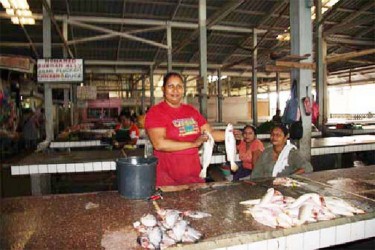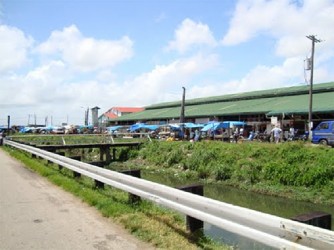The state of health of municipal markets is often a useful barometer of the economic outlook in the community in which that market is located. Earlier this week, that appeared to be very much the case at the Number 79 Municipal Market, Corriverton Market as it is known, where a marked scarcity of consumers had cast a pall of gloom on the trading environment.
Kavita has been a seafood vendor at the market for a decade and she paints a less than encouraging picture of the prevailing commercial climate in Corriverton. When we met her at her fish table inside the market on Tuesday she had arrived from her home in Clonbrook several hours earlier. She was fussing over the fact that with the 1300 hours closing time fast approaching she was still struggling to sell about half a pail of fish – tilapia and banga mary. She had bought the tilapia at $5000 a pail and banga mary at $6000.00 a pail. The market was beginning to slow down markedly and she was staring ruefully at the unsold fish and contemplating the inconvenience of having to place it in cold storage for the next day’s trading.
The Corriverton Market had been Commissioned by the then President Bharrat Jagdeo in October 2002. At the time it seemed to portend an expanding Corentyne economy. The decline of the sugar industry would appear to have seen to that.

Sunil Jewram
You get a graphic picture of the role that sugar has played in the Berbice economy when you talk with people on the Corentyne Coast. It seems as though everyone’s economic fortunes are inextricably bound up with the sugar industry.
Probably one of the largest municipal markets in the country, the Corriverton Market was, on Tuesday, doing less than brisk trade.
The current economic downtown might well have brought Sunil Jewram close to the end of his tether. After 24 years as a chicken vendor he says he is seriously contemplating packing it in. At Corriverton, chicken is currently being retailed at $460 per pound. The current shortage coupled with the modest profit margin has made the trade less lucrative. In 1998, he customarily sold 160 chickens per day. These days it could be as few as a dozen per day. On Saturdays, sales would usually triple.
Sunil subscribes to the view that the extent of spending power in Corriverton has failed to keep pace with commercial expansion. The inevitable result has been too much goods chasing too little money. Corriverton is now a community of supermarkets and malls. Much of what money is being spent at the supermarkets and malls is what used to be spent in the market – at least that is what Sunil believes. Again, the problems in the sugar industry and the attendant loss of jobs has not helped.

We met Vijay on Tuesday. She was shopping at the market. She is intimate with the impact of the sugar industry on the economic fortunes of Corriverton. Her husband’s substantive job as a tractor operator has disappeared with the declining fortunes of the Skeldon Estate. These days he works five eight-hour days a week doing ‘shovel work’. There is no overtime or weekend work and that has implications for the family income. Vijay recalls the halcyon days when “the estate” provided water. These days, water bills add to what, in some instances, are already an onerous existence.
We had gone to Corriverton to meet with Sato in his capacity as the owner of fishing vessels. As it turned out he is involved in other aspects of commerce at Corriverton. He concedes that the shoulders of the sugar industry are no longer broad enough to carry the economic weight of the Corentyne. Rice and cash crops along with the fishing industry and the ingenuity of the Corentyne communities would appear to have ‘stepped up.’
No one seemed keen to talk about cross border trade with Suriname. Those who did preferred to remain nameless and once you promised anonymity they were blunt about the virtues of the illegal movement of goods from Suriname which they say is helping to fuel the local engine of commerce in circumstances where this side of the border is offering few alternatives.





